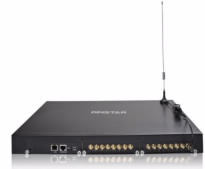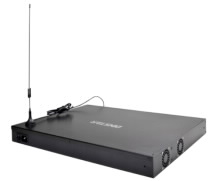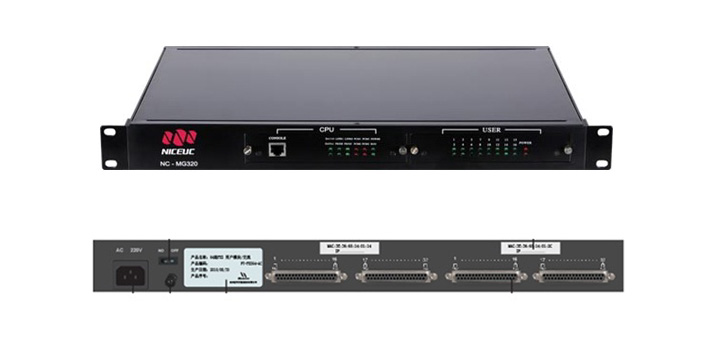GSM gateway is a multi-functional product used to effectively implement the smooth transition between PLMN (GSM) and VoIP network. It’s sea blue small appearance, beautiful and practical, easy-of-use to satisfied necessary of customers. It’s a cost-effective gateway for call termination (VoIP to GSM) and origination (GSM to VoIP). It is fully compatible with leading Soft-switch and SIPserver.


PLMN (GSM) Gateway Specifications
| Port
|
| SIM card slot
|
4/8 SIM card slot
|
| Ethernet port
|
1 LAN x 10/100M Base-TX RJ45
|
| Management port
|
1 Console
|
| Voice feature
|
G.711A/U law, G.723.1, G.729A/B
Silence suppression & detection
Comfort noise generation(CNG)
Voice activity detection(VAD)
Echo cancellation(G.168)
Adaptive (dynamic) jitter buffer
Call progress tone generation
Programmable gain control
|
| Protocol Standard
|
SIP V2.0 (RFC 3261,3262,3264)
RTP/RTCP (RFC 1889,1890)
Static IP, PPPoE, DHCP
Network protocol:
IP, TCP, UDP, TFTP, FTPS, RTP, RTCP, ARP, RARP, ICMP, Ping, NTP, SNTP, Http, DNS
NAT traversal: static NAT, STUN
ARP/RARP (RFC 826/903)
VLAN 802.1p/802.1q
DNS/DNS SRV (RFC 1706/RFC 2782)
|
| Radio feature
|
Frequency band: GSM 850/900/1800/1900 MHz
DTMF mode: Signal/RFC2833
SMS/SMSC/USSD
Open API interface
Call duration limitation
One/two stage dial-up, Hotline
Polarity Reversal
Custom IVR
PIN modified
Carrier select
BCCH
SIM card expansion supportive
|
| Management and maintenance
|
Web based configuration
Configure backup/restore
Support English and China language
Firmware upgrade by TFTP
Web login password modify
Factory reset
Output CDR/Tracking newsby syslog
Ping and Tracer test on web
Traffic statistics: TCP,UDP,RTP
VoIP call statistics
PSTN call statistics: ASR,ACD,PDD
System log outputs CDR and tracing information
Web-based Ping and Tracer tests
Transmission protocol statistics: TCP, UDP, RTP
VoIP call statistics
PSTN call statistics: ASR,ACD,PDD
|
| Physical properties
|
Power: input:100-240V,50-60Hz,1.1A Max, output:12VDC,4.0A
Power consumption:4G: 15w; 8G: 25w
Temperature (operation): 0 ℃ to +45 ℃
(storage): -20 ℃ to +80 ℃
Operation Humidity: 10%-90% no condensation
Dimensions (W/D/H): 255 mm x 220 mm x 30 mm
Weight: 1.48 kg
Color & material: blue, aluminum box
|
| Packing content
|
Gateway
RJ-45 network cable
Antenna
User's manual CD
|
NC-MG320 features a compact structure, 1 U high, and can be mounted in a 19-inch standard cabinet or independently installed in a small equipment room. NC-MG320 supports 220 V AC power supply, adapting different conditions in an equipment room.

Supported Signaling Protocols
| Item
|
Specifications
|
| Interface
|
FXO/FXS/SIP/E1
|
| E1 signaling
|
ISDN PRI (ITU-T Q.931, Q.921)
|
| SS7 ((ITU-T Q.700 series), 24 bits/14 bits PC, ISUP/TUP
|
| V5.2 (ITU-T G.964, G.965)
|
| R2
|
| Q.SIG
|
| VoIP protocol
|
SIP:
RFC3326 (Reason header in SIP messages)
RFC3372 (SIGTRAN and SIP-T)
RFC2327 (sdp)
RFC3398 (ISUP-SIP Mapping)
RFC3261 (sip)
RFC5806(Diversion Indication in SIP)
RFC2833(DTMF)
RFC3362(t.38)
RFC 3261(SIP 2.0)
RFC3204(MIME media types for ISUP and QSIG Objects)
RFC3578(Mapping of ISUP overlap to SIP)
|
| Audio encoding/decoding
|
Codec:G.711 U-Law and A-Law, G.711 Appendix 1, G.723.1 and G.723.1 Annex A, G.729 Annex A and Annex B, G.726, GSM, ARM,ILBC
|
| Fax protocol
|
T30, T38, and pass through
|
| Network protocol
|
IP, NAT, ICMP, ARP, HTTP, BOOTP, FTPS, TFTP, DHCP, PPPOE, SNMP, Diff-Serv
|
| Echo cancellation
|
G.168 128ms
|
Physical Characteristics
| Item
|
Specifications
|
| Input voltage
|
110-240V AC
|
| Full-load Power
|
50 W
|
| Dimensions
|
(W×D×H)
|
482 mm x 286 mm x 44 mm (1U)
|
| Weight
|
3.5 kg
|
| Operating environment
|
Temperature
|
0°C to 50°C
|
| Relative humidity
|
< 80%
|
Configuration Details
| Configuration Capacity
|
Physical Specifications
|
| Configuration Type
|
NC-MG320 analog gateway
Configuration Capacity
|
Port
|
NC-MG320 analog gateway
Port Quantity
|
| FXO/FXS
|
4 to 32
|
PCM port
|
0 to 4
|
| E1/T1
|
0 to 4
|
4 line RJ45
|
8
|
| VOIP channel
|
32 to 128
|
Network port
|
1
|
|
|
|
Serial port
|
1
|
|
|
|
Power port
|
1
|
TETRA gateways support the PTT signaling, AT commands, VOX, COR (carrier detect), channel change, PTT hotline, and rich specifications, applicable to various application scenarios and network sizes.
An ETS trunking gateway is 1 U high and supports 19-inch standard rack installation.

Technical Specifications
| Item
|
Specifications
|
| Wireless ports
|
DB37 ports, including an audio port, a PTT port, a COR port, and a five-wire serial port, each supporting four channels
|
| Other ports
|
| Power supply
|
Rated voltage: 220 V
voltage fluctuation: ±5%
Frequency: 50 Hz±5%
Wave form distortion rate of the phase-to-phase voltage: < 5%
|
| Ground port
|
Ground resistance: ≤ 1 ohm
|
| Ethernet port
|
10/100M adaptive
|
| Dimensions and operating environment
|
| Dimensions (WxDxH)
|
440 mm x 328 mm x 45 mm
|
| Weight
|
4 kg
|
| Power consumption
|
Rated power: 45 W
|
| Operating environment
|
Temperature: -10°C to +60°C
Humidity: 10% to 90% non-condensing
|
| Voice processing
|
| Voice encoding
|
G.711, G.723, G.729
|
| Fax
|
T.30, T.38
|
| Call completion rate
|
> 99%
|
| Voice guarantee
|
QoS echo suppression (G.165/G.168-2000), voice priority (TOS), DiffServ jitter buffer, comfort noise generation (CNG), and voice activity detection (VAD)
|
| Average call setup delay
|
< 100 ms
|
| Reliability
|
| System availability
|
Availability ≥ 99.999%
|
| Mean time between failures
|
> 20 years
|
| System fault recovery time
|
< 15 minutes
|
| Standard compliance
|
| Flame retardance
|
UL94V-0 materials
|
| Electrical safety
|
UL 508, CSA C22.2/14; EN61010-1
|
| EMC
|
EN50082-1 (IEC801-2,3,4)CE
|
| Surge protection
|
IEEE-472 (ANSIC37.90)
|
| Shock and vibration resistance
|
IEC68-2-6
|





